As it happened: Uganda Today - Tuesday March 5
Ten years after the first confirmed case of an HIV-infected person being rid of the deadly disease, a man has shown no sign of the virus for nearly 19 months.
ROLLING NEWS THROUGHOUT THE DAY
Presented by Joseph Kizza
@joekizza
____________________________________
3:00pm
Good evening
Will leave it here for now.
#UgandaToday
____________________________________
2:50pm
Top US envoy to visit Uganda

| New Vision's David Lumu: |
A top US envoy to Africa will next week visit Uganda on a three-day tour that is expected to strengthen ties between Kampala and Washington.
According to officials from the US Embassy in Kampala, during his visit, Tibor Nagy, the assistant secretary of the US who oversees policy and programs in Africa, will also hold bilateral talks with President Yoweri Museveni.
He is expected to jet into the country this Thursday.
After meeting Museveni, the visiting US diplomat will also hold a joint press conference with the US Ambassador to Uganda, Deborah Malac on Saturday at Serena Hotel.
#UgandaToday
____________________________________
2:15pm
Uganda Cubs fall to Cameroon
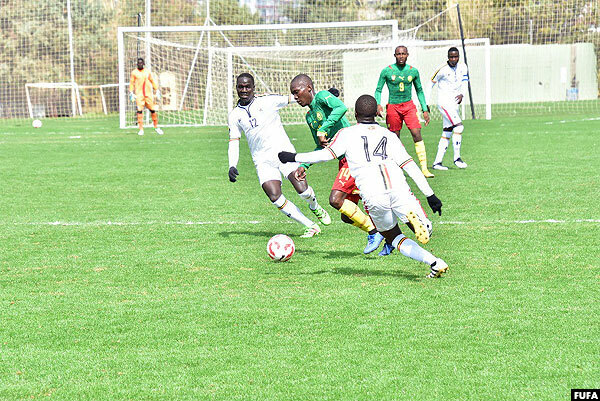
Uganda's U17 side are in Turkey for residential training ahead of the 2019 Africa U17 Cup of Nations.
In the buildup, they had a warmup match against Cameroon's under-17 side on Tuesday and lost 4-1.
It was all sqaure at half time, with Rogers Mugisha and Enel Wambali on the scoresheet. The Cameroonian lads went on to get three more goals, with Uganda's John Rogers sent off late on.
#UgandaToday
____________________________________
1:40pm
MPs tour Soroti Fruit Factory
The rains are here. Farmers are happy. And fruit farmers, particularly, will have been even more delighted with the change in weather.
In the meantime, legislators that make up the parliamentary Agriculture Committee have travelled to the east to take a tour of the fruit factory in Soroti.
May I bring to your attention that it is a fact-finding visit, this one.
MPs on the Agriculture committee take a tour of the Soroti fruit factory. The committee is on a fact finding visit to establish the status of the factory. pic.twitter.com/ebb3aB9NyJ
— Parliament of Uganda (@Parliament_Ug) March 5, 2019
#UgandaToday
____________________________________
12:50pm
Today in the Uganda Premier League
Action is back, for you local football enthusiasts!
Express FC will host Mbarara City FC in the earliest kickoff (4pm).
Defending champions Vipers SC will be away at Ndejje University while Nyamityobora will be at home against Onduparaka FC. These two games will kick off at 4:30pm.
#UgandaToday
____________________________________
12:20pm
First year at the helm of the Force
Time flies, eh? Police chief Martin Okoth Ochola has been in charge of the Uganda Police Force for one year now.
👉DOWN MEMORY LANE👉
— New Vision UGANDA (@newvisionwire) March 4, 2019
This day last year the President of Uganda Kaguta Museveni appointed AIGP Okoth Ochola as the Inspector General of Police replacing Gen. Kale Kayihura.
Assess his performance a year later 📖. pic.twitter.com/7oLtgNaNtk
#UgandaToday
____________________________________
11:55am
Uganda represented at ITB Berlin Tourism Trade Fair
The Uganda Tourism Board is set to showcase Uganda at the annual ITB Berlin Tourism Trade Fair, which starts this Wednesday and ends on Friday at the Messe in Berlin.
A Ugandan delegation comprising over 30 Ugandan tour operators, UTB officials and officials from the Uganda Wildlife Authority is led by the State Minister for Tourism, Wildlife and Antiquities, Godfrey Kiwanda Ssubi.
A team of over 15 hotel owners from the Uganda Hotel Owners Association and over 10 independent trade visitors will also be joining the trade fair.
UTB's chief executive officer Lilly Ajarova said that event is a great opportunity for Ugandan tour operators to attract new business given the high profile as well as large number of participants that grace the event every year.
According to ITB, more than 109,000 trade visitors and potential travelers seeking business opportunities as well as inspiration for their next trip visited last year's trade fair. That number is expected to rise this year.
#UgandaToday
____________________________________
11:49am
A 60,000 barrels-per-day-capacity refinery
| New Vision's Pascal Kwesiga: |
Uganda and the Albertine Graben Refinery Consortium (AGRC) have agreed to build a 60,000-barrels-per-day-capacity refinery.
The Government and the companies it negotiated the refi nery project with had earlier proposed a refinery of 30,000 barrels per day initial capacity, which would be upgraded to 60,000 later. The AGRC comprises YAATRA, Saipem S.p.A, Lion Works Group and Baker Hughes General Electric (BHGE) firms.
The consortium said it would complete the 60,000 barrels per day refi nery in one go. The companies presented the final refinery configuration proposal details to the Ugandan government team led by energy minister Irene Muloni in Milan, Italy last week.
#UgandaToday
____________________________________
11:40am
PICTURE THIS - Know where this is?
Another beautiful day in Kampala🌞! . Looks so beautiful from this side of town💞 🌐https://t.co/CF9INffQFi pic.twitter.com/v9XzqxMDvg
— Visit Kampala (@visitKampala) March 4, 2019
#UgandaToday
____________________________________
11:23am
'London patient': second case ever of HIV remission
A second person is in sustained remission from HIV-1, the virus that causes AIDS, after ceasing treatment and is likely cured, researchers were set to announce at a medical conference Tuesday.
Ten years after the first confirmed case of an HIV-infected person being rid of the deadly disease, a man known only as the "London patient" has shown no sign of the virus for nearly 19 months, they reported in the journal Nature.
Both patients had received bone marrow transplants to treat blood cancers, receiving stem cells from donors with a rare genetic mutation that prevents HIV from taking hold.
"By achieving remission in a second patient using a similar approach, we have shown that the Berlin patient was not an anomaly," said lead author Ravindra Gupta, a professor at the University of Cambridge, referring to the first known functional cure.
Millions of people infected with HIV around the world keep the disease in check with so-called antiretroviral therapy (ARV), but the treatment does not rid patients of the virus.
"At the moment, the only way to treat HIV is with medications that suppress the virus, which people need to take for their entire lives," said Gupta.
"This poses a particular challenge in developing countries," where millions are still not receiving adequate treatment, he added.
Close to 37 million people are living with HIV worldwide, but only 59 percent are receiving ARV. Nearly one million people die every year from HIV-related causes.
A new drug-resistant form of HIV is also a growing concern.
Gupta and his team emphasised that bone marrow transplant -- a dangerous and painful procedure -- is not a viable option for HIV treatment.
But a second instance of remission and likely cure following such a transplant will help scientists narrow the range of treatment strategies, he and others said.
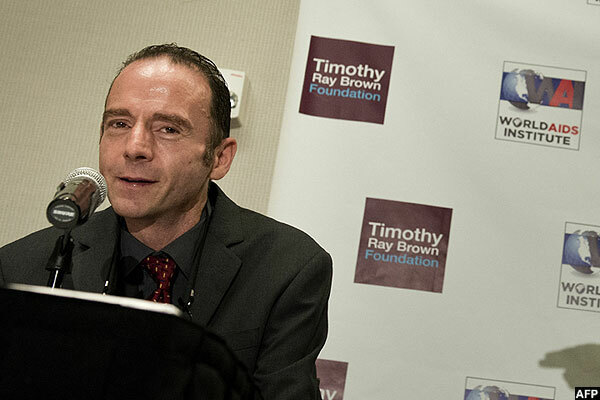 Timothy R. Brown, previously known as the "Berlin Patient", was considered the only known person to be cured of the HIV virus
Timothy R. Brown, previously known as the "Berlin Patient", was considered the only known person to be cured of the HIV virus
'A cure is feasible'
"The second case strengthens the idea that a cure is feasible," Sharon R Lewin, director of the Peter Doherty Institute for Infection and Immunity and the University of Melbourne, told AFP.
"We can try to tease out which part of the transplant might have made a difference here, and allowed this man to stop his anti-viral drugs."
Both the London and Berlin patients received stem cell transplants from donors carrying a genetic mutation that prevents expression of an HIV receptor, known as CCR5.
"Finding a way to eliminate the virus entirely is an urgent global priority, but is particularly difficult because the virus integrates into the white blood cells of its host," Gupta explained.
The study describes an anonymous male patient in Britain who was diagnosed with HIV infection in 2003 and has been on antiretroviral therapy since 2012.
Later that year, he was diagnosed with advanced Hodgkin's Lymphoma, a deadly cancer.
He underwent a so-called haematopoietic stem cell transplant in 2016 from a donor with two copies of a CCR5 gene variant, a combination carried by about one percent of the world population.
CCR5 is the most commonly used receptor by HIV-1.
People who have two mutated copies of CCR5 are resistant to most HIV-1 virus strains, frustrating the virus' attempts to enter host cells.
As with cancer, chemotherapy can be effective against HIV as it kills cells that are dividing.
But replacing immune cells with those that do not have the CCR5 receptor appears to be key in preventing HIV from rebounding after the treatment.
After the bone marrow transplant, the London patient remained on ARV for 16 months, at which point ARV treatment was stopped.
Regular testing has confirmed that the patient's viral load remained undetectable since then.
Timothy Brown, the "Berlin patient", was given two transplants and underwent total body irradiation to treat leukaemia, while the British patient received just one transplant and less intensive chemotherapy.
"I did not want to be the only person in the world cured of HIV," Brown wrote in a medical journal in 2015, explaining why he decided to reveal his identity.
"I want to dedicate my life to supporting research to search for a cure or cures for HIV."
The research team for the London patient will present their findings at the annual Conference on Retroviruses and Opportunistic Infections (CROI) in Seattle, Washington.
#UgandaToday
____________________________________
11:15am
Remission patient shows HIV may be 'curable'
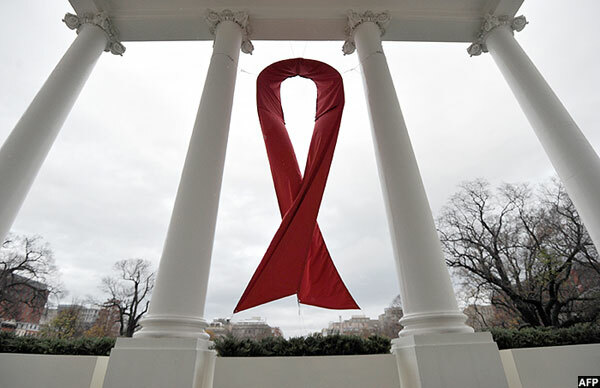
A person in sustained remission from HIV-1, the virus that causes AIDS, shows that the disease may one day be curable, the International AIDS Society (IAS) said Tuesday.
Reacting to the case of the patient in London who had no sign of the virus for nearly 19 months after undergoing a bone marrow transplant, the group said it demonstrated "proof of concept that HIV is curable."
"The hope is that this will eventually lead to a safe, cost-effective and easy strategy to achieve these results using gene technology or antibody techniques," said IAS President Anton Pozniak.
#UgandaToday
____________________________________
11:06am
Use Police emergency lines . . .
. . . in case of imminent threat to life and public safety.
We want to encourage the public to embrace the use of the police emergency lines in case of any imminent threat to life and public safety, and in situations which require urgent response.https://t.co/dNSi1xeUVI
— Uganda Police Force (@PoliceUg) March 4, 2019
#UgandaToday
____________________________________
10:47am
Uganda-Rwanda border matters
.@OfwonoOpondo: If Rwanda deploys in their territory what is wrong with that? Isn't it their territory? "If Rwanda deployed in an area which is not their territory then that would be a problem" #UGCabinetResolutions pic.twitter.com/zRLRypLSTs
— Uganda Media Centre (@UgandaMediaCent) March 5, 2019
#UgandaToday
____________________________________
10:45am
Uganda-Rwanda border matters
Ofwono Opondo also talks about one item that has been ubiquitious recently - the Uganda-Rwanda border issue.
"We have bilateral engagements with them [Rwanda]. We have diplomatic channels with them and we shall engage with them through those channels."
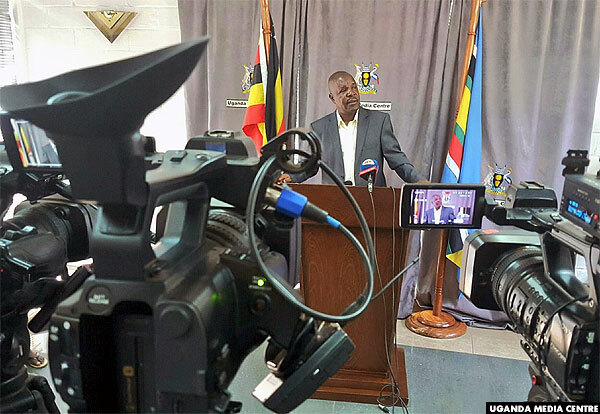
#UgandaToday
____________________________________
10:40am
CABINET RESOLUTIONS: NRM Parliamentary Caucus retreat
Ofwono Opondo says Cabinet decided that the 2019 Retreat of the NRM Parliamentary Caucus will take place at the National Leadership Institute in Kyankwanzi for a week - starting March 13 until 20.
He points out some of the objectives of the meeting. One is to appraise members on Uganda's economic progress.
Another is to deepen members' knowledge and understanding of the NRM ideology, regional integration and society.
The retreat is also to review progress made under the National Development Plan (NDP) II and to contribute to the identification of priorities for the NDP III.
Importantly, the meeting aims to take stock of the achievements so far realized and challenges met in the implementation of the NRM Manifesto 2016-2021.
Those are some of them.
#UgandaToday
____________________________________
10:35am
CABINET RESOLUTIONS: FY 2019/20 Budget
We learn that Cabinet also approved the Budget for the Financial Year 2019/2020, which is subject to Parliamentary appropriation process and approval.
#UgandaToday
____________________________________
10:28am
CABINET RESOLUTIONS: Unvalidated pensioners off payroll by June
Ofwono Opondo says Cabinet approved the recommendations and strategies proposed by the public service ministry for managing the traditional and teaching service pensioners or claimants.
Among the resolutions, unvalidated pensioners and validated pensioners whose biometrics are not matching with National Identification and Registration Authority (NIRA) will be deactivated from the pension payroll and payment stopped by June 1.
That means that ministries, departments and Local Governments will have to finalise authentication of the unvalidated pensioners and pensioners whose data are not matching with NIRA data and present such cases for validation by May 31.
To facilitate this process, an investigation by the Inspectorate of Government of records that will be deactivated from the payroll will be instituted.
Once this has been done, ministries, departments and Local Governments will finalize updating of the pension database with validated and matching records by the end of May.
#UgandaToday
____________________________________
10:28am
Cabinet resolutions
Government spokesperson and Uganda Media Centre executive director Ofwono Opondo is addressing the press about the resolutions by Cabinet following their meeting Monday at State House, Entebbe.
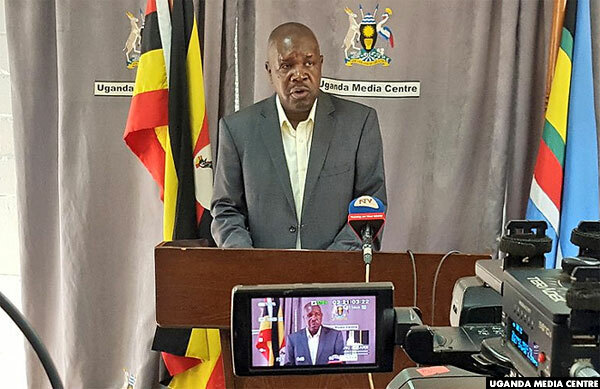
#UgandaToday
____________________________________
10:15am
WATCH: Around Uganda
Around Uganda: Katakwi residents attacked by rats
— New Vision UGANDA (@newvisionwire) March 5, 2019
Details and more stories in the full bulletin
Visit https://t.co/smlDq3h75u#NewVisionTV cc. @ruthdavoice pic.twitter.com/Nb585qKscd
#UgandaToday
____________________________________
9:55am
Bunyoro Kingdom, Britain in talks over artefacts seized in 1984
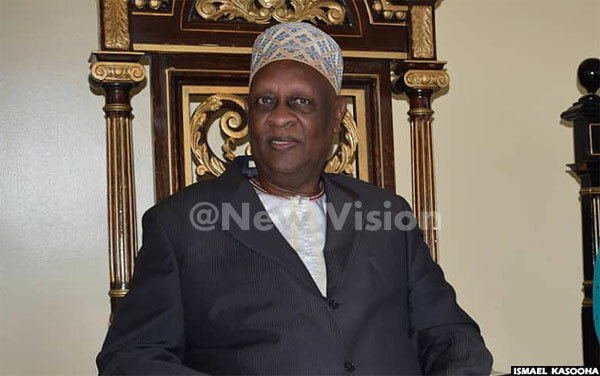
Bunyoro Kitara Kingdom and the UK are engaged in negotiations for the return of about 280 artefacts, including a throne, reportedly snatched from Bunyoro by the colonial administration over 100 years ago. The British High Commissioner in Kampala confirmed to New Vision that a throne is among the 279 artefacts displayed at the University of Oxford's Pitt Rivers Museum. Bunyoro's eight-legged throne and other artefacts are said to have been confiscated in 1894, before the kingdom lost the anticolonialism war against Britain with the defeat of Omukama Kabalega in 1899.
The artefacts were reportedly taken away from Bunyoro by Col. Henry Colville, the then commissioner and consul general for the Queen of England. An official at the British High Commission, who preferred anonymity, confirmed talks between Bunyoro and the UK over the artefacts.
The kingdom's prime minister, Andrew Byakutaga, in a November 12, 2018 letter, introduced to the High Commissioner a team of officials charged with negotiating with the UK on behalf of the cultural institution over the artefacts. The team is headed by the kingdom's second deputy prime minister and tourism minister, Apollo Rwamparo. Other members include the third deputy prime minister in charge of restitution and reparations, Stephen Twesige; the minister for investment, Daudi Cwa; princes Richard Juuko and James Kisoro and princess Dorcas Mugenyi, all of Bunyoro kingdom.
The kingdom said its negotiations will focus on identifying British museums holding the artefacts. The eight-legged throne, known as Nyamyaaro, was used by kings during enthronement and coronation ceremonies. By confiscating it, the British deprived Omukama Kabalega of a symbol of power. Today, the king sits on another throne known as Kaizirokweera during enthronement and coronation functions. Before it was taken away, Nyamyaaro was kept in a prominent room in the Omukama's palace.
In an earlier interview, the British High Commissioner explained that 30 of the 279 artefacts from Bunyoro were donated to the university by Dr Akiki Kanyarusoke Nyabongo, a prince in Tooro kingdom, who wrote his doctorate on Ugandan religion in Oxford in the 1930s. The vast majority of the artefacts, it added, were collected by the Rev. John Roscoe between 1919 and 1920 and donated to the university in 1922. Roscoe is said to have worked closely with the then king of Bunyoro while he carried out his research in the kingdom.
#UgandaToday
____________________________________
9:47am
Today's Ras toon
The Government has banned the production of alcohol in sachets with effect from March 31 at the factory premises.
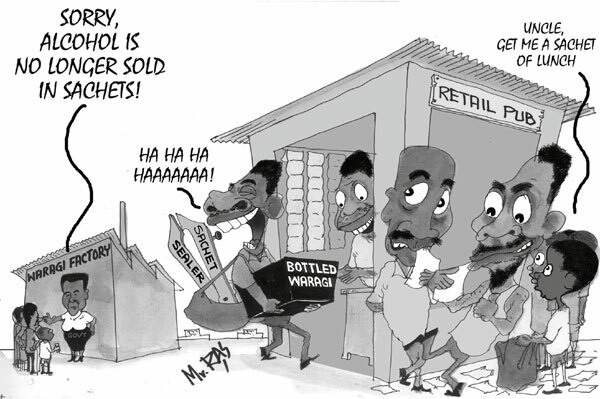
#UgandaToday
____________________________________
9:43am
Moving on . . .
Next up, what's our cartoon of the day saying?
#UgandaToday
____________________________________
9:40am
Today's dose of inspiration:
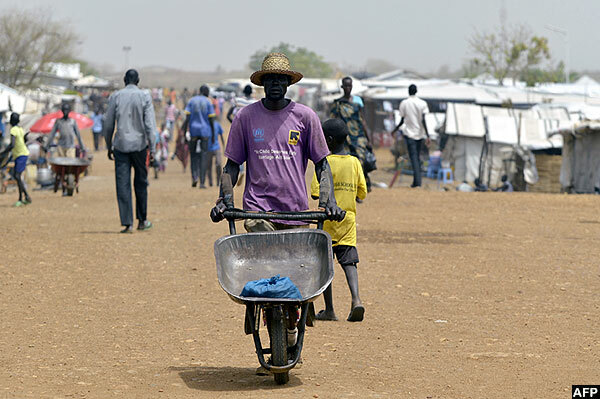
UN Secretary-General Antonio Guterres is proposing that the peacekeeping mission in South Sudan be strengthened to shore up a power-sharing deal he said presents the "best and only option" to end the conflict that has plagued the country.
Guterres said in a report to the Security Council, seen by AFP on Monday, that the makeup of a regional protection force deployed in Juba as part of the mission should be reviewed.
The council is expected to decide next week on renewing the mandate of the 16,000-strong UNMISS mission, six months after the latest in a string of peace deals was signed to end South Sudan's five-year war.
In the report, Guterres proposed that the peacekeeping mandate "be strengthened to allow the mission to support the implementation of the agreement and peace process in a nimble and flexible manner."
The UN chief did not specify whether additional troops or police would be needed, but said troop-contributing countries would be asked "to contribute required capabilities if necessary" for UNMISS to carry out the new tasks.
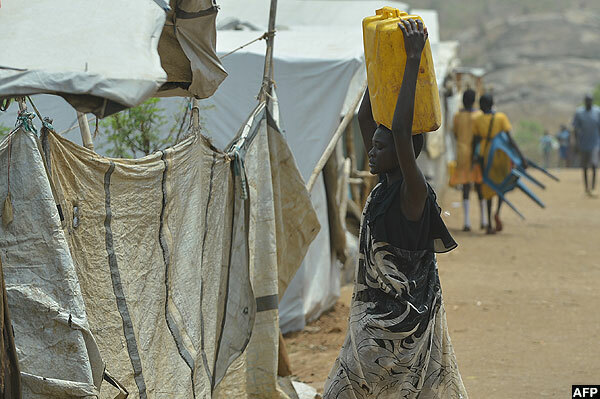
Guterres offered to present an assessment of the requirements for the new peacekeeping mandate and said the makeup of the Juba protection force should be in line with regional demands.
The IGAD group of countries has asked that Sudan, Uganda, Djibouti and Somalia be allowed to send troops to the regional force, which will play a crucial role in maintaining security in Juba.
A previous peace accord fell apart when heavy fighting broke out in Juba following the return of rebel leader Riek Machar, who fled the capital on foot chased by tanks and helicopter gunships.
"I believe that the agreement is currently the best and only option for a political solution to the conflict in South Sudan," Guterres said in the report sent to the council last week.
South Sudan, which broke away from Sudan in 2011, descended into war in December 2013 when President Salva Kiir accused Machar, his former deputy, of plotting a coup, driving millions from their homes.
Last week, three leading UN agencies warned that nearly 7 million people were facing severe hunger in the coming months, an increase of 13 percent since January last year.
#UgandaToday
____________________________________
9:35am
Algerian TV presenter 'quits' over Bouteflika letter
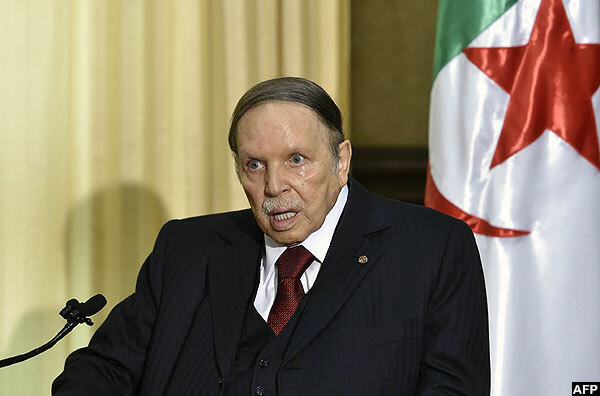
An Algerian state television presenter resigned Monday because she was angry that she had to broadcast parts of a letter by ailing President Abdelaziz Bouteflika, one of her colleagues said.
Nadia Madassi, presenter of Canal Algerie's evening programme for 15 years, on Sunday night read extracts from the letter, in which the president vowed his bid for a fifth term would be his last, due to widespread protests against his rule.
The presenter was "given President Bouteflika's message at the last minute... (and) was left feeling uncomfortable", said Madassi's Canal Algerie colleague.
"It was the straw that broke the camel's back -- since the start of the protests, we have not been allowed to work" properly, said the colleague who spoke on condition of anonymity.
The television station was not immediately available for comment on her resignation, which was widely reported in Algerian media.
Journalists working for state media had previously complained that their bosses have imposed a blackout on coverage of weeks of protests against Bouteflika's decision to take part in April's election.
The president suffered a stroke in 2013 and has rarely been seen in public since.
Tens of thousands took to the streets across the country on Friday.
The president's letter saw him pledge to set up a "national conference" in the event that he wins a fifth term, paving the way for his departure before the end of that mandate.
This apparent bid to placate protesters was received sceptically on Monday by Algerians, who promised further rallies against Bouteflika's rule.
Madassi has decided to drop her presenting role in favour of working in editorial, the colleague said.
#UgandaToday
____________________________________
9:30am
Key oil field in Libya to reopen after three months

One of Libya's most important oil fields is set to reopen nearly three months after it was taken over by an armed group, the state-owned National Oil Corporation said Monday.
Production at the Al-Sharara site in southern Libya "is expected to resume within the next few hours", the NOC said in a statement.
The announcement marks the end of "force majeure" declared in December; a legal measure which exempted the corporation from responsibility for failure to deliver on contracts.
Getting production underway again follows "the removal of the armed group responsible for its blockade," the NOC said, which led to losses of $1.8 billion.
"This costly episode highlights the importance of NOC remaining independent and free from extortion and armed incursion," said the corporation's chairman Mustafa Sanalla.
Located around 900 kilometres (560 miles) south of Tripoli, Al-Sharara had been producing some 315,000 barrels per day, almost a third of Libya's current output.
The site is operated through a joint venture between the NOC and four European energy firms.
Steeped in chaos since the ousting of dictator Moamer Kadhafi in 2011, Libya remains divided between rivals.
The internationally recognised Government of National Accord sits in Tripoli, while a parallel leadership in eastern Libya is backed by military strongman Khalifa Haftar.
His forces seized the Al-Sharara field last month, as part of a military operation in the country's south.
Haftar's self-styled Libyan National Army entrusted the management of the site to the NOC, which refused to restart production until armed groups had left.
#UgandaToday
____________________________________
9:25am
Chad rebel group says 7 killed in border 'ambush'
Deserters from a Chadian rebel group based in Libya were ambushed at the border of the two countries leaving seven people dead, their group said Monday.
The attack happened on Saturday at Sossal on the Chadian border where the deserters were supposed to meet and turn themselves over to Chad's army as well as surrender their arms, the Union of Forces for Democracy and Development (UFDD) said in a statement.
The UFDD rebel group said instead of the army they were met by the Toros-Boros, Sudanese rebels, "who opened fire."
AFP was able to confirm the fighting with local people in the area, but it was not possible Monday to independently confirm the identity of the assailants.
The Chadian government has not commented on the incident.
Several Chadian rebel groups are based in the Sahel desert region of southern Libya.
On Sunday, Chad closed its border with Libya until further notice.
In 2008, the UFDD, with other rebel groups, launched an offensive on the capital N'Djamena to seize power, but they were stopped at the presidential palace by the army with the support of ally and former colonial power France.
In January, another rebel group, the UFR entered northeast Chad from Libya but were stopped by several French air strikes and the Chadian army. French jets intervened at the government's request, France says.
Chad, a vast and mostly desert country with more than 200 ethnic groups, has suffered repeated coups and crises since it gained independence from France in 1960.
Under President Idriss Deby, a former head of the armed forces, the country has taken a leading role in the fight against jihadism in the Sahel region.
#UgandaToday
____________________________________
9:20am
With cash, crime and drama, Nigeria politics inspire movie makers
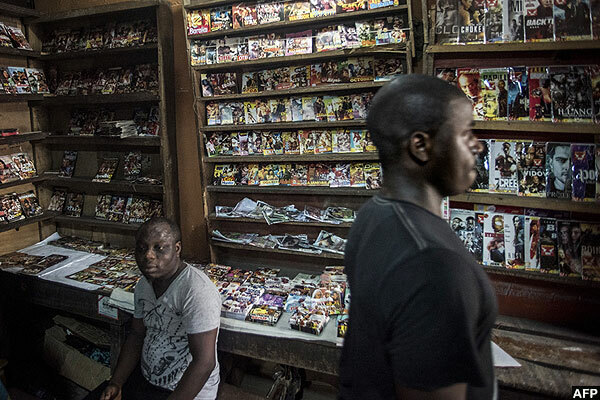
With its alliances and betrayals, crimes and cash, and even a dash of witchcraft, the theatrical twists of Nigeria's politics are inspiring directors from the country's Nollywood movie industry.
The saga surrounding Nigeria's recent election, delayed for a week just hours before voting started, has film-makers convinced they may have hit movie gold.
Nigerians watched as their election delivered all the ingredients of a thriller, including charges of vote card fiddling, armoured cars filled with cash delivered to politicians' homes, and even arrests of opponents by the secret police -- all in the space of one week.
"I can do 100 movies based on Nigerian politics," said local director Ike Nnaebue. "There is too much drama going on (...) and I believe that, as story tellers, it's our responsibility to start the conversation and begin to start changes."
With 190 million people in Nigeria and a growing wider audience on the African continent and among Nigeria's diaspora, Nollywood has become the world's second-largest cinema business after India's Bollywood in terms of the number of films the industry pumps out.
And juicy local politics is increasingly a theme.
In "Dr. Mekan", a satire released in 2018, Nnaebue tells the tale of the rise of a "repat", a Nigerian who grew up or lived abroad for a long time and who returned to live in Nigeria, often disconnected from reality.
"As soon as he comes back from the States, he has fantastic ideas of how to run his state, and wants to become governor of Anambra. He has good intentions, but he doesn't understand how things are being done in Nigeria," the director said.
In one key scene the candidate makes an ambitious election promise to improve agriculture and develop local rice cultivation. The crowd applaud but a rumour runs through the crowd that his rival is offering food handouts at his rally and the spectators run off to get their free bags of rice -- imported from China.
In another scene, the candidate's campaign team is busy handing out cash to the crowd, while Mekan himself shouts at young people "Money will destroy you!"
"In this movie, we laugh at us. It's a critic of the foolishness of the politicians and of the people," the director said. "We need to start asking ourselves what is wrong in our country and change it. Cinema is a tool for it."
President Muhammadu Buhari was re-elected last month after the delayed poll that angered voters. It was the second ballot box victory for Buhari, a one-time military ruler who was first elected in 2015 to lead Africa's top oil producer.
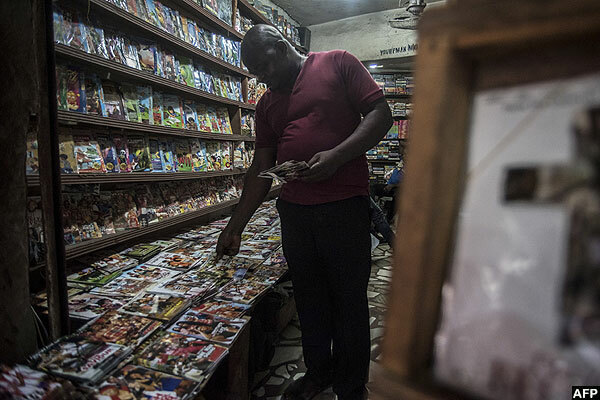
A sense for change also motivated Mike-Steve Adeleye to write the screenplay of his latest film, "Code Wilo", previewed in Lagos early March.
Adeleye did not choose humour, but action to criticise what Nigerian politics has become, and especially the idea of political "Godfathers" who bless or destroy aspiring candidates.
In his new film, a Nigerian ruling party's sponsor announces that his daughter will be the candidate for the next state governor, without even consulting his political base or the voters.
"Citizens are spectators. They are just watching politics, and they have no word to say on the scenario. It's already written. We are just here to see who will be elected," Adeleye said.
In "Code Wilo", the young candidate and adored daughter of the "godfather" is kidnapped for ransom.
"I'm hoping that when politicians see the end of the film, they will get scared. I hope it will haunt them and then they will start thinking about what they are doing to us," the director said
Nigeria is a cultural heavyweight in Africa, leading in film and music. But it has long been confined mostly to just entertainment.
But recently, artists such as rappers M.I. or Falz are touring the country to educate young people to vote and to hold their leaders accountable. That message is far from the usual music video clips of champagne, pools or luxury cars.
Ideas may be starting to change little by little on the music scene, but in the cinema "Nollywood is still mainly focused on business. It's all about bling bling and plastic life," Adeleye said.
"But we can't keep going like this. Elections after elections, it's getting worse, and it's more depressing. As Africans we have stories to tell, stories that can have an impact and make our society better."
#UgandaToday
____________________________________
9:15am
Sirleaf's son, others charged over Liberia bank scandal
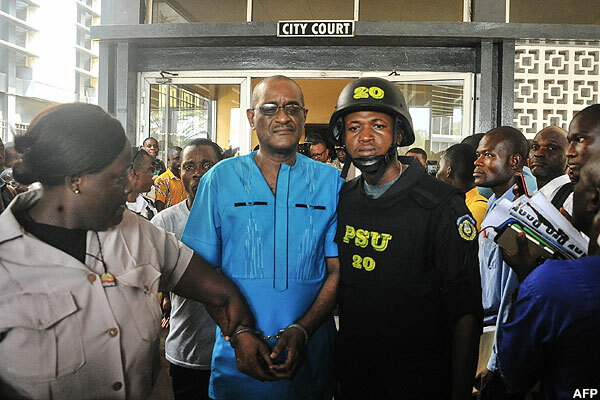
Five once senior figures at the Liberian Central Bank, including the son of long-serving former president Ellen Johnson Sirleaf, were charged Monday with criminal conspiracy and "economic sabotage" following a probe into a banknote printing scandal.
A Monrovia court ordered former deputy governor Charles Sirleaf, ex-bank head Milton Weeks and bank official Dorbor Hagba to be held in jail pending the scheduling of their trial.
Another two suspects still being sought face similar charges over their handling of billions of Liberian dollars.
The crowded court heard that between 2016 and 2018, Sirleaf "purposely with wicked and criminal intent connived and conspired with other officials" to print local currency but also pocket some of the proceeds.
Judge Kennedy Peabody said Sirleaf would be charged "with the commission of economic sabotage, misuse of public money, property or records and theft and or illegal disbursement and expenditure of public money and criminal conspiracy."
"Charles Sirleaf and his accomplices Milton Weeks and Dorbor Hagba, including defendants Richard Walker and Joseph Dennis who are at-large, are criminally liable (for) ... Liberian dollar banknotes brought into the country which cannot be accounted for by them."
President George Weah separately expressed thanks to the country's partners, especially the United States, for helping with the investigation.
"I wanted the Liberian people (to) know that we are transparent," the president said in a statement.
"Whatever happens from (the) findings, we will follow it because in the process of getting information, a lot of things do come out," he added.
"When everything is done, I hope Liberia will be in peace and people will not take to the streets again."
Weah announced the probe in September into the handling of some 16 billion Liberian dollars ($99 million, 87 millions euros) destined for the central bank.
What exactly happened to the money remains unclear, with a report by the US investigative agency Kroll Associates saying the money arrived at the central bank but that there were failings at each stage of the process.
One of the world's poorest countries, Liberia has been struggling with rampant corruption which Weah vowed to combat when he took office a year ago.
Sirleaf, the first elected female head of state in Africa, was president for 12 years.
She gained widespread praise for stable governance following back-to-back civil wars which killed an estimated quarter of a million people.
In 2011, she was joint winner of the Nobel Peace Prize.
#UgandaToday
____________________________________
9:12am
Around the continent
A quick look at what's going on around the continent. That's coming up next . . .
#UgandaToday
____________________________________
9:08am
Today's dose of inspiration:
Having a rough morning? Place you hand over your heart ❤️. Feel that? That's called purpose. You are alive for a reason. Don't give up.
#UgandaToday
____________________________________
9:05am
Good morning! - Let's glide through this day, shall we?

After a night of rain in some parts of Kampala, the sun has since climbed out of its shell, and as I write this, we have some dose of glorious daylight upon us.
Good morning and welcome to this live page. Right here, I will try to keep you updated with news happening around Uganda - plus a bit about what's going on on a continent we have grown to call Africa.
On your way to work? Ploughing through that bowl of cereal? Or might you be struggling to pick yourself out of that cozy bed?
Whatever it is, Tuesday is here!
